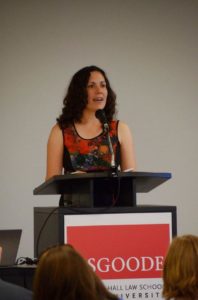Refugee Law with Hilary Evans Cameron
A former litigator, Hilary Evans Cameron represented refugee claimants for a decade and now holds a doctorate in refugee law from the University of Toronto.
A major focus of her work has been the process of judging a refugee claimant’s credibility. How do – and how should – asylum systems manage the insecurities associated with refugee status decision-making?
She has looked at this question from various angles. Working at the intersection of law and cognitive psychology, she has considered the kinds of evidence that ought to inform refugee status judgments (International Journal of Refugee Law, 2008, 2010) and has used experimental and quantitative methodologies to look closely at the kinds of inferences that these adjudicators are drawing (Canadian Journal of Human Rights, 2020; SSHRC-funded postdoctoral research, results forthcoming).She has explored the right to participate in these kinds of legal processes (UBC Law Review, 2014).
In her recent book, Refugee Law’s Fact-finding Crisis: Truth, Risk, and the Wrong Mistake (Cambridge University Press, 2018), Hilary considered how normative judgments about how to apportion insecurity are reflected in legal structures and reasoning paradigms. Most recently, she has considered the role that artificial intelligence may soon play in refugee status decision-making, with a focus on the crucial role that these normative judgments must play in thinking through how this technology will operate in this context (“Artificial intelligence for a reduction of false denials in refugee claims” under consideration at Journal of Refugee Studies, Oxford).



